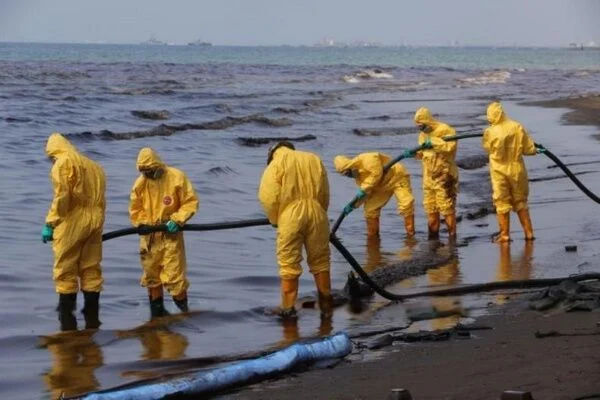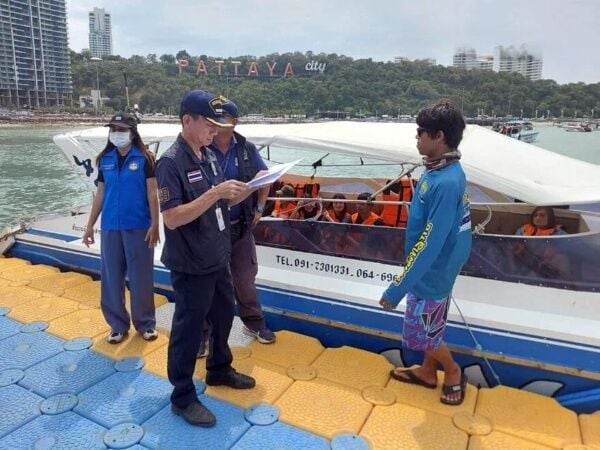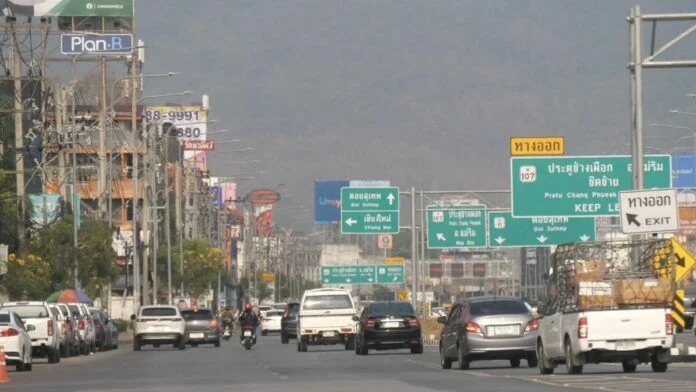Business
Can Thailand achieve high-income status by 2037? (video)

As Thailand strides towards achieving high-income status by 2037, a formidable challenge emerges in the form of widespread flooding, which continues to wreak havoc on its economy.
In an exclusive interview with Thai PBS World, the World Bank unveils a groundbreaking strategy aimed at expediting flood management, potentially reshaping Thailand’s economic landscape. Discover the transformative insights and ambitious plans set to redefine Thailand’s future.
Amid Thailand’s pursuit of economic supremacy, the collaboration between the Thai government and the World Bank emerges as a beacon of hope. Manuela V. Ferro, Vice President for East Asia and Pacific at the World Bank, emphasized the significance of Thailand’s government undertaking a massive, intricate, and ambitious flood management project, necessitating resources and expertise. The World Bank stands ready to assist and support Thailand’s government in completing this critical endeavor.
Ferro underscored Thailand’s susceptibility to natural disasters, particularly citing the devastating floods of 2011, which inflicted a staggering cost of US$46.5 billion (approximately 1 trillion baht) and equivalent to 12.6% of GDP. Urgent action is imperative to shield millions from peril and bolster the nation’s competitive edge.
However, the path to economic revitalization faces challenges. Prime Minister Srettha’s highly publicized digital wallet scheme, aimed at rejuvenating the economy, receives mixed reviews. While providing short-term relief, experts raise concerns regarding its long-term efficacy in fostering development.
Ferro advocates for strategic investments in education and skilled labor, crucial for Thailand’s resurgence amidst the global supply chain recalibration.
“Thailand can cultivate a more favorable business environment”
Ferro emphasized, highlighting the necessity for a skilled workforce to ascend the value chain, as reported by Thai PBS World.
In the aftermath of pandemic-induced economic stagnation, Thailand’s economic future hangs in the balance. Yet, there is optimism as the World Bank pledges steadfast support for infrastructural projects and flood management, propelling Thailand towards prosperity.
In related news, when torrential rains lashed Sri Racha in Chon Buri province, it triggered two hours of relentless downpour on Tuesday, March 19, resulting in flash floods that wreaked havoc across the district.
Business
Rayong fishing groups sue Star Petroleum over oil spill devastation

A group of 14 individuals hailing from Rayong, 2qmate release of 50,000 liters of crude oil into the Gulf of Thailand, besmirching the shores of Rayong.
The province’s Fisheries Office reports a toll of at least 2,600 fishermen affected by this calamity. Beyond the depletion of fish stocks in the area, the contamination rendered the remaining catch unsalvageable.
Subsequent to the disaster, local fishermen have found it unfeasible to sustain themselves. Their customary fishing yields from the Rayong coastline have notably dwindled. Many have resorted to extending their maritime excursions or ceasing fishing operations entirely.
“14 Rayong residents sue SPRC over 2022 oil spill, seeking compensation for livelihood losses.”
Lamom Boonyong, president of the Pak Nam Ban Rao fishing community, elucidated that the lawsuit extends beyond the culpability of the oil spill’s perpetrator. Five additional entities stand accused of contravening environmental safeguarding statutes.
Representing diverse factions comprising over 800 members collectively, the plaintiffs aim to establish a precedent with their litigation.
Should the verdict favor their cause, it could pave the way for compensation claims by remaining members, potentially entailing a financial burden of approximately 240 million baht for the implicated company, as per Bangkok Post.
Furthermore, these groups implore governmental intervention to facilitate the restoration of the local marine ecosystem. The Civil Court is slated to review the lawsuit on May 17th.
Business
Pattaya Port Authority prepares 700 speedboats for Songkran

As the Songkran Festival looms closer, Pattaya Port Authority prepares for an influx of travellers with an initiative to ensure safety and convenience. From April 11 to 17, they are set to facilitate seamless water travel between Koh Larn and Pattaya.
To cater to the needs of both locals and tourists, the authority has orchestrated a fleet comprising 60 passenger boats and 700 speedboats. Their ambitious setup aims to handle at least 20,000 travellers daily, totalling a staggering 140,000 to 150,000 over the seven-day festival.
Ekkrach Kantharo, Director of the Regional Marine Office, Pattaya Branch, highlighted the meticulous preparations.
“With Thailand offering visa-free entry for Chinese tourists this year, there’s been a noticeable surge in visitors to Pattaya, especially those flocking to the pristine shores of Koh Larn for relaxation.”
Passenger boats, each capable of accommodating 150 travellers, will shuttle between Pattaya and Koh Larn hourly, with three to four boats scheduled based on demand. Meanwhile, speedboats will offer flexibility for private trips.
The allure of Koh Larn’s scenic beaches and crystal-clear waters has made it a top pick among tourists, driving up the demand for water travel services. Daily port activity in Pattaya has skyrocketed to over 15,000 passengers, with foreigners making up 70%, including Chinese, Russians, and Indians, while Thai nationals account for the remaining 30%.
During the Songkran festival period, the Pattaya Port Authority will set up a dedicated water convenience and public relations centre at the port. Collaborating with Pattaya City, marine police, tourist police, and rescue workers, they aim to prioritise safety.
Strict regulations will be enforced, with boat operators required to conduct thorough checks on vessel conditions and safety equipment, including life jackets and lifebuoys, reported Pattaya Mail.
Regular inspections for drugs will also be carried out to maintain a secure environment for all travellers amid the festive celebrations.
In related news, the Tourism Authority of Thailand (TAT) is anticipating a robust tourism influx from North and South America this year, with a projection of at least 1.5 million tourists – a figure that mirrors the 2019 statistics. This surge is attributed to the confluence of the Songkran celebrations and the Easter holiday in April.
Business
Chiang Mai tourism expects rebound despite hotel booking slump

Chiang Mai, once bustling with tourists, is currently facing a downturn in hotel bookings as of Wednesday.
According to La-iad Bungsrithong, advisor to the Northern Thai Hotels Association, reservations are only at 30% capacity compared to the same period last April.
Despite this gloomy scenario, there is a glimmer of hope on the horizon. La-iad anticipates that occupancy rates will rebound to 70% during the upcoming Songkran Festival.
Scheduled from April 13 to 15 in Chiang Mai, the festival is expected to draw a large number of tourists. Some areas have even designated April 1 as the kickoff for water play festivities.
In related news, Chiang Mai tourism remains optimistic about a recovery despite the current slump in hotel bookings.
Traditionally favored as a cool winter retreat, Chiang Mai has faced additional challenges, notably air pollution. La-iad expressed optimism about a potential increase in tourist numbers by April, provided that the PM2.5 issues are effectively addressed.
“Chiang Mai is currently grappling with alarming levels of air pollution.”
However, this problem extends beyond Chiang Mai, affecting the entire northern region of Thailand. The air pollution crisis significantly impacted the tourism industry in March, causing hotel occupancy rates to drop to 50% from the expected 60%, according to La-iad.
She emphasized the necessity for a comprehensive plan from the Thai government to tackle air pollution. While this might not directly affect local businesses, the contaminated air, high in PM2.5, poses significant health risks.
“The PM2.5 issue requires a nationwide approach that entails concrete and comprehensive plans from the government.”
Additionally, La-iad proposed that Chiang Mai could benefit economically and in terms of tourism with the establishment of an entertainment complex. This could potentially replace the unregulated underground gambling dens. However, she stressed the importance of stringent legal measures and regulations to mitigate any potential societal issues stemming from the casinos.
“However, stringent legal measures and regulations must be carefully implemented to prevent any societal problems arising from the casinos.”
-

 News1 year ago
News1 year agoMICE industry must prioritise people management to sustain growth
-

 Entertainment2 years ago
Entertainment2 years agoDark history to exotic delights: Cambodia and Thailand tourist strategy
-

 Entertainment2 years ago
Entertainment2 years agoJohn Legend enjoys spring break in Phuket
-

 Entertainment2 years ago
Entertainment2 years agoSiam Paragon and Bangkok Pride proudly celebrates Pride Month from May 31 – June 4, 2024
-

 Entertainment2 years ago
Entertainment2 years agoPhuket’s Tourist Case court division resumes after four-year break
-

 Fashion2 years ago
Fashion2 years agoFed’s rate cut sends gold soaring past US$2,200 per ounce
-

 Fashion2 years ago
Fashion2 years agoGold prices in Thailand surge with ornaments at 37,350 baht
-

 Fashion2 years ago
Fashion2 years agoFashion brands linked to brutal slaughter of reptiles in Thailand (video)




